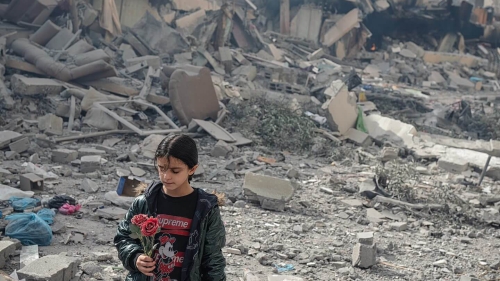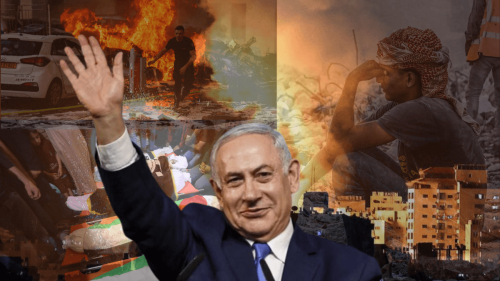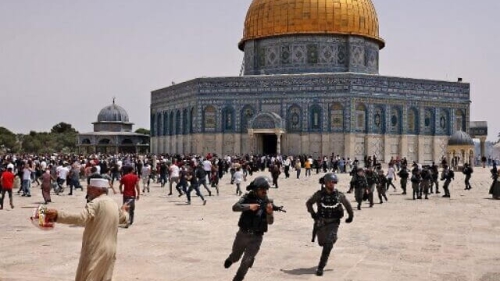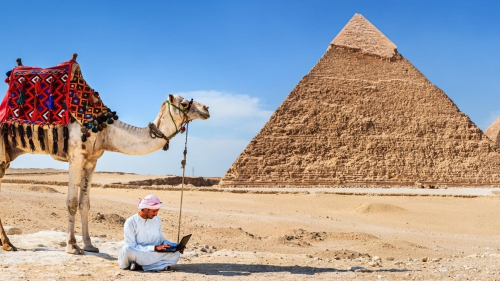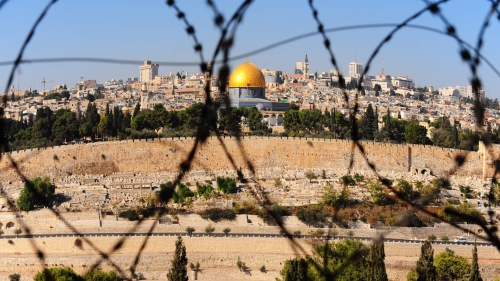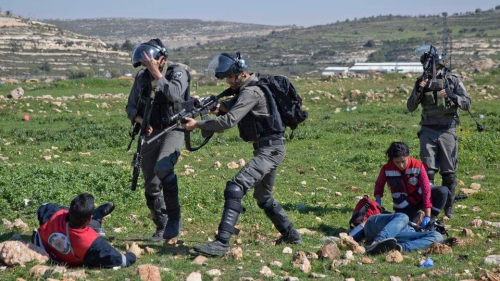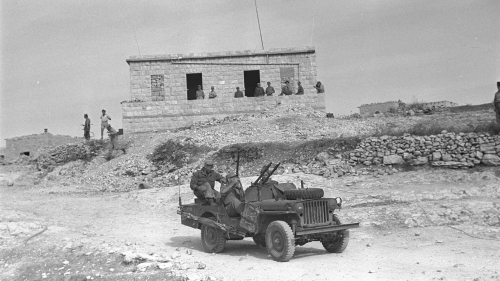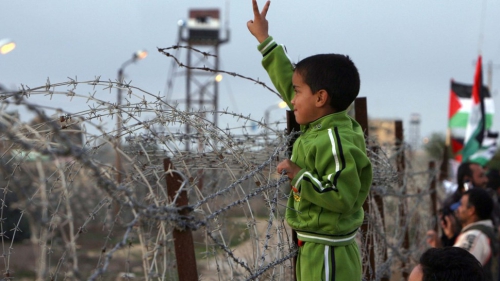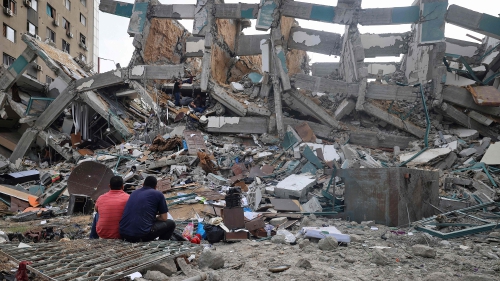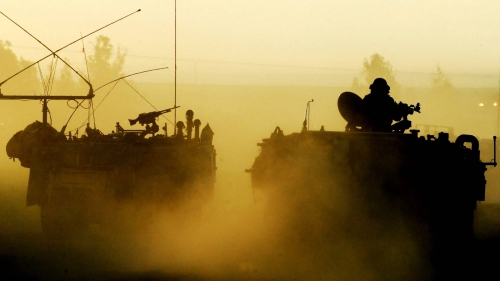Harassment at Israeli Checkpoints
Ten years ago, Palestinians left their houses and farms to discover a new form of Israeli oppression: the checkpoint. The Israeli military phenomenon sitting squarely in the center of our roads told us all that these roadblocks were not temporary. They ominously signaled more oppression to come. The move was an enhancement of Israel's plan to separate us into village archipelagos and cantons. Apartheid had begun in earnest. Palestinian villages and towns, not to mention closure of the city of Jerusalem, lay before us.
Since just the sight of the cement barriers stopped us short on our way to work, hospitals, schools and neighborhood visits, we could not slough off this latest Israeli affront which they referred to as another "security measure". We knew it was yet another imposition we'd have to live with. It did not make for happy relations with the brothers and sisters who had decided to move into our backyards and our front yards as well. At least the move gave us something new to talk about and talk we did. Taking action against the checkpoint move, however, was another matter.
The guards manning the checkpoints were fully armed. Perhaps they would not shoot, but the butt of a gun can be painful, too. Furthermore, the checkpoints had accessories: special offices to issue permits. Anyone living outside the city of Jerusalem would now have to get an entry pass to enter the Holy City.
Just imagine driving from your home in Alexandria, Virginia, to your office in the Department of the Interior in Washington, DC, and having to stop at least four times to be checked before you crossed the Potomac and, finally, having to get out and argue for a pass to the city in order to simply go to work.
I live with my family in Dahyat al-Barid, just across the Israeli checkpoint on the Ramallah-Jerusalem road. My home is within walking distance of the checkpoint and the city of Jerusalem. For the last ten years, every member of my family, including myself, wanting to go about our daily business in the city just down the street have had to pass through this checkpoint. Even our closest grocery store is across the demarcation line, so a simple trip to pick up milk becomes a hassle sometimes involving long waits because the Israeli soldiers at the checkpoints have decided to pull a suspect aside without the courtesy of letting the rest of us pass.
I remember being in America for the first time and going on vacation with my host family. We were on the Indiana toll road and I saw a huge barrier rising ahead, slow down signs and bumps on the road to make sure we did. I felt apprehension as we approached the booths, and I almost asked if the checkpoint was put up for me.
My hosts were puzzled by my uneasiness. To them, this barrier was a benefit not a threat. I wish they could know what the sight of it meant to me. On the other hand, maybe it was better that they didn't know what life is like in another part of the world, a place where systematic discrimination was made possible by their own American government.
My friend, Betsy, tried to tell me that the Israeli checkpoints are just like U.S. tollbooths. Not exactly, I told her. The checkpoints are not there to raise money nor are they there to improve our roads. Unlike tollbooth operators who wish travelers a pleasant day, checkpoint guards are there to harass us. Then, there's the ID card issue. Should, by chance, one of us leave home without our Jerusalem ID (those born in Jerusalem have a special identity card), that person is in for more harassment than usual and a return trip to the house to get the card is the smallest penalty. No, being Palestinian and living in a canton created by those who would possess our land is not like driving from New York to California without a question asked along the way.
My mother is the driver in our family. She works at a school in Shufat, which is just a 15-minute ride from our home. That is, it was a 15-minute ride ten years ago. Now, with the checkpoints in place, it takes her as long as an hour during rush hour. Often Mom is chauffeuring me and, as I sit there, I make good use of my time. Sometimes, I jump out and run over to a little shop to buy a newspaper and coffee. I see school kids doing their homework in the back seat and women fixing makeup or men actually shaving their beards. I'm proud of the coping mechanisms of my people. Stop us short and we'll come up with useful ways to make the time count. I feel sorry for the frustrated drivers who honk their horns and yell slurs, often with the risk of being pulled out of their cars and held for long periods.
Once a friend of mine was attending the funeral of his sister-in-law in Bethlehem. A well-known Palestinian attorney, he crossed through the last checkpoint on his drive from Jerusalem to Bethlehem but was told to leave his car at the checkpoint for special inspection. He left his car and walked into town only to return to find that checkpoint soldiers had set his car on fire. "Security," they told him. Another time, I was walking through a checkpoint and a soldier was kicking a pregnant woman in the stomach for some undefined offence. I stopped to help and ended up in detention for the rest of the day. It amuses me to hear friends tell of how they avoid the checkpoints by going through people's backyards and up and around the hills of the Holy Land on days when the guards are on the alert.
Sometimes, when I'm in a hurry, I leave my mom's car and take one of our service vans that run all over the West Bank. The "courageous" service drivers have developed some skills that help them know how to "handle" the checkpoints. They know all the tricks and the back ways into town.
For me, the greatest problem of living in a world of checkpoints is fatigue. Daily anxiety provoked by wondering every few miles whether or not there will be "an incident" is an exercise in the infliction of Israeli-imposed stress. I feel that for us, everyday Palestinians, the checkpoints are designed to make life so unbearable that we'll just go away and let Israel have our homes and land.
Checkpoints are a sign of apartheid leveled at us by those who claim that having had evil done to them, evil by them is permissible, all in the name of security.
That we Palestinians had nothing whatsoever to do with the victimization of the Jews in Europe or with their self-imposed exile doesn't matter. Something, you see, has happened to the Zionists and is exhibited through their denial of what we experience every day: the warped Jewish interpretation of the "Do unto others as you would have others do unto you" axiom.
The Israeli-American war decreed against the indigenous people of Palestine is as unwinable as the war in Viet Nam was for the Americans. "Might makes right" can never win over the will of oppressed people who love their homeland and who really have no choice but to stay in place. There are more Palestinian refugees outside our borders today than any other group. Where is the place to put more? Where is the famous intellect of the Jew? Have these people lost all their common sense?
If the Israelis murder every single one of us, we will die in body, but Jews will die in spirit. One cannot perpetuate evil and not feel the effects and that is the bottom line to all of this. Might makes right may overtake us, but morality and justice will have the last word. That is my strength and the strength of the people I love in my small world. We may lose the lives and lifestyles we love, but if we do, the moral strength and standing of Judaism will be gone forever. That's what losing really means.
_________________________________
Samah Jabr is a freelance writer and medical student in Jerusalem. This article was written with the assistance of her American friend Elizabeth Mayfield of Ames, Iowa.






